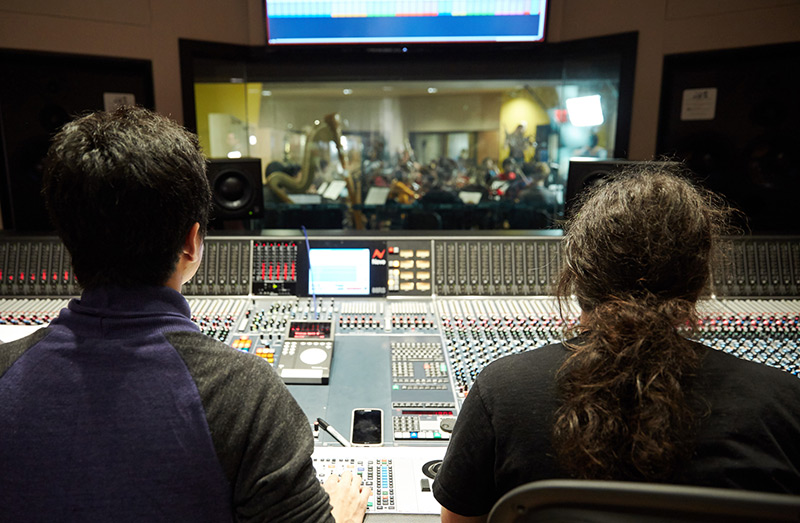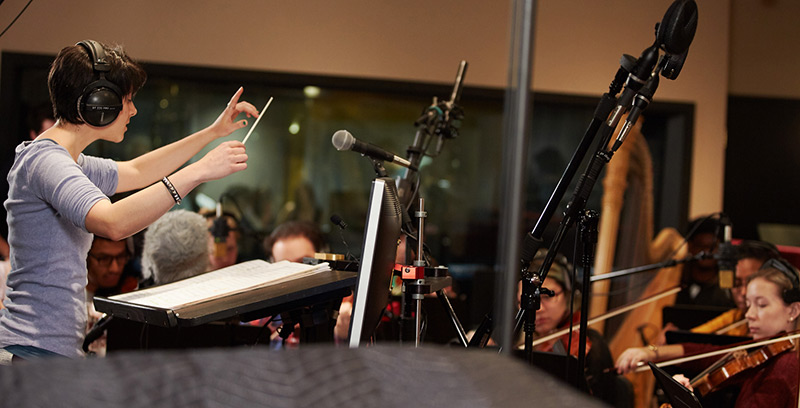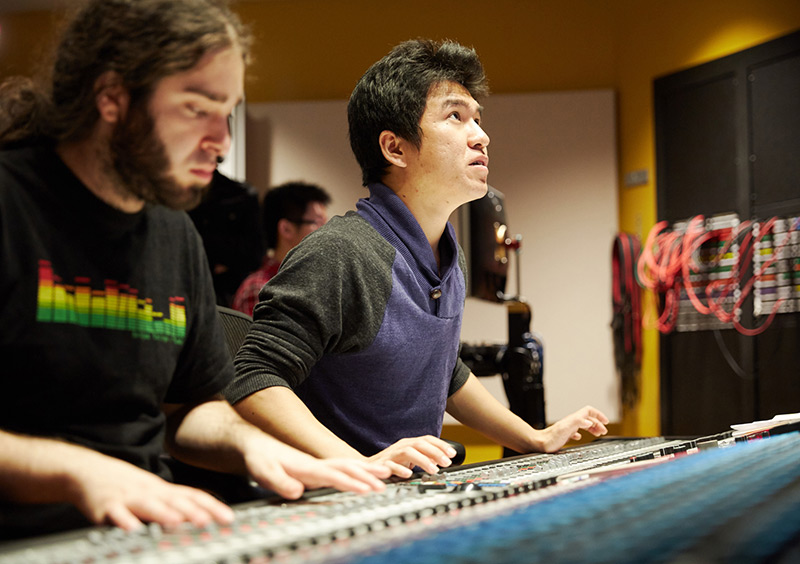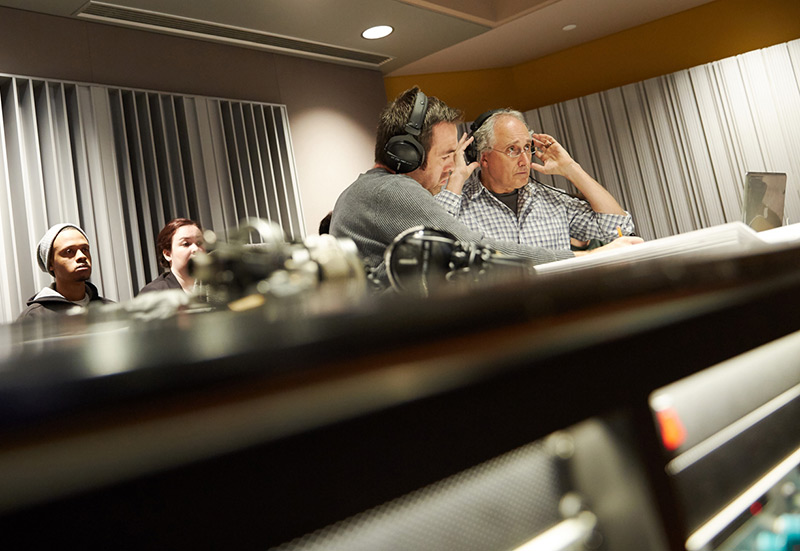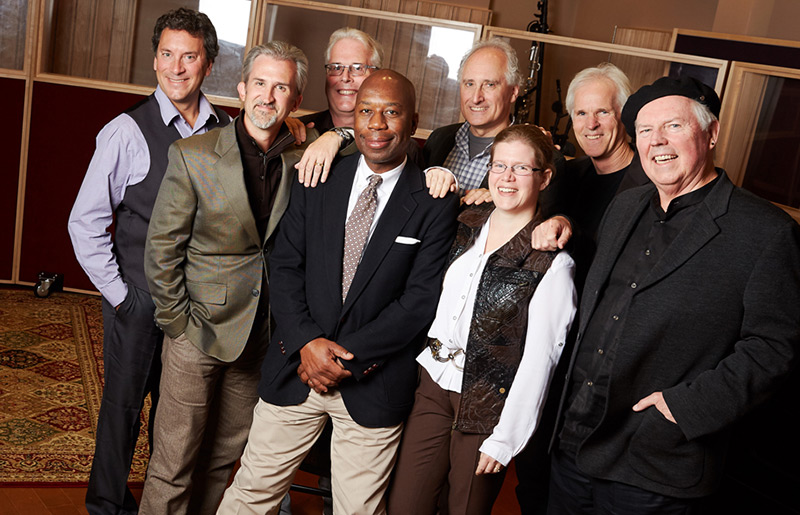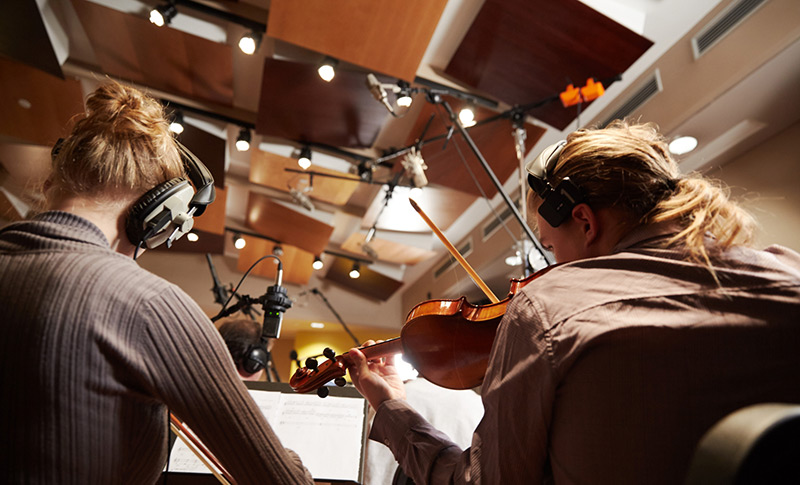Students Settle (Film) Score in ‘Hollywood, Massachusetts’
The catch-22 of breaking into the music industry, as in many fields, is that employers want to hire people with experience, but you can’t attain that experience until you get hired for that first job. In the case of composing, conducting, recording, or performing a film score, Berklee offers students a unique opportunity to circumnavigate that chicken-or-the-egg dilemma: collaborative new courses present a carbon-copy simulation of the process of composing, performing, and recording to picture a Hollywood-style film score.
"I don't know of any other program like this," says George S. Clinton, chair of Berklee's Film Scoring Department, "and especially considering that this is an undergraduate experience, it's pretty unique and amazing to be a part of this."
Working in the Shames Family Scoring Stage, a professional-level recording studio designed specifically for orchestral film score recording by the renowned Walters Storyk Design Group and located in Berklee's new campus building at 160 Massachusetts Avenue, students learn not only their piece of the film scoring puzzle, but how their role intersects with all others in order to create a healthy collaboration that yields the intended result.
Students come together in the collaboration from three distinct but intertwined courses: Advanced Dramatic Orchestration and Synchronization Techniques (for film scoring majors), Orchestral Recording Techniques (for music production and engineering majors), and Studio Scoring Orchestra (for student orchestral musicians across a variety of majors).
Watch students discuss this unique collaborative process:
Faculty, Chairs Discuss Groundbreaking Collaboration
Berklee faculty and chairs recently convened to confer on the curriculum behind these unique interwoven courses. Below are some edited and abridged excerpts from that conversation.
“The overriding paradigm of this course is creating a situation that replicates a Hollywood studio session from beginning to end. The level of composition and music preparation, playing, and recording—it feels like you’re at Fox or Sony or something. When you walk in that room, people pick up their game. It’s been really wonderful.”
- Richard Davis, professor, Film Scoring
“This is a highly complicated endeavor and there are multiple skills that are required. Your musicality, your technicality, your maturity, and your interpersonal communication skills all have to come together to service the goal. This is a great example of music being a team sport. It’s a big, well-oiled machine when it’s working correctly.”
- Rob Jaczko, chair, Music Production and Engineering (MP&E)
“The biggest challenge for the musicians is that they don’t get the music ahead of time. Just like it is in Hollywood, they come in to the session and there it is on the music stand. So they have to figure out tempo changes, meter changes, difficult technical passages, and they need to find those places where they might get tripped up in the first run-through. There is nothing in their previous experience that could possibly prepare them for the level of professionalism that is expected of them in this orchestra, and it’s amazing the level that they rise to.”
- Gus Sebring, professor, Brass
“When you’re talking about students being able to come in and sight-read a piece, it’s really important for students to learn what the professional standard is, even if they fall short of that at some point—so that you know if you were to go into this performance situation, what is the standard? The standard doesn’t change, and you either meet it or you don’t.”
- Ron Savage, chair, Ensemble
“While this is mechanically replicating exactly what happens in Hollywood, the difference is that students have the opportunity to fail and to learn from that.”
- Alison Plante, assistant chair, Film Scoring
“Students learn all about ProTools, the console, click tracks, and such—but it’s also about being comfortable with conductors and composers. It’s about sitting with an orchestra and the people reading scores and integrating all of that. So it’s about technology, but it’s also about how you get along with people in the industry.”
- Jim Donahue, associate professor, Music Production and Engineering (MP&E)
“As soon as we announced this course, we had sections filled almost instantly, because students realize the kind of experience they can get here.”
- Dan Thompson, assistant chair, Music Production and Engineering (MP&E)

